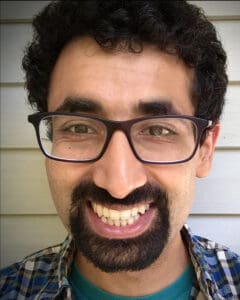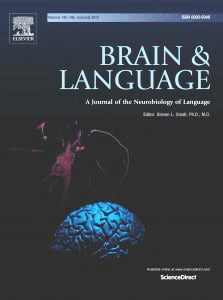Dissertation Award
Sahil Luthra
 The Society for the Neurobiology of Language is pleased to announce the 2021 Dissertation Award recipient: Sahil Luthra
The Society for the Neurobiology of Language is pleased to announce the 2021 Dissertation Award recipient: Sahil Luthra
The Dissertation Award is generously sponsored by Brain and Language.
A right hemisphere role in talker-specific phonetic processing
Thursday, October 7, 2021, 10:45 - 11:15 am PDT Log In to set Timezone
Speaker: Sahil Luthra, University of Connecticut
Brain and Language Dissertation Article
The role of the right hemisphere in phonetic processing is thought to be relatively minimal, at least in comparison to the role of the left hemisphere. However, the right hemisphere is known to play a critical role in vocal identity processing, a fact that is striking given that the acoustic-phonetic details of the speech signal can differ substantially between talkers. In this talk, I will describe evidence from fMRI that the right hemisphere – and more specifically, the right posterior temporal cortex – plays a role in helping listeners adapt to the idiosyncratic ways that different talkers produce their speech sounds. Specifically, I will describe evidence that (1) talker information and phonetic detail are simultaneously represented in the functional activation patterns of the right superior temporal sulcus and that (2) the process of conditioning phonetic identity on talker information is supported by the coordinated activity of a left-lateralized phonetic processing system and a right-lateralized talker processing system. Overall, these data clarify the neurobiological mechanisms through which listeners accommodate talker-specific phonetic variation and may point to potential subclinical impairments in patients with right hemisphere damage.
About Sahil Luthra
Sahil Luthra completed his Ph.D. in Psychological Sciences at the University of Connecticut in August 2021. He will move to Carnegie Mellon University as a postdoctoral researcher in September, where he will study the neural basis of auditory selective attention.
The goal of Dr. Luthra’s research program is uncovering how our prior knowledge guides our in-the-moment perception of language. He uses a combination of neuroimaging, behavioral, and computational approaches to address this challenge.
Dr. Luthra has published several articles related to this theme. These include a recent behavioral study that resolves a decades-old debate about lexical feedback in spoken word recognition (Luthra et al., 2021, Cognitive Science), a study of the neural basis for lexically-guided perceptual learning (Luthra et al., 2020, J. Cognitive Neuroscience), and computational investigations of predictive processing and predictive coding (Luthra et al., 2021, Psychonomic Bulletin & Review). Recently, Dr. Luthra published a single-author theoretical review of the role of the right hemisphere in accommodating the phonetic variability that exists between talkers in Neurobiology of Language (Luthra, 2021), and he further explored this issue in his dissertation work.
Dr. Luthra is also an active practitioner and advocate of open science as well as clear science communication across disciplinary boundaries. He is strongly committed to promoting diversity, equity, and inclusion.
Honorable Mentions
Kiefer Forseth, UT Health Science Center at Houston
Mariya Toneva, Carnegie Mellon University
